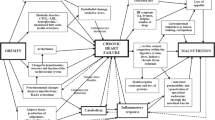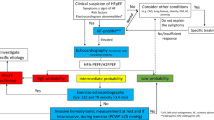Abstract
Objective
To discuss the characteristics of Chinese medicine (CM) syndrome factors and distribution of congestive heart failure (CHF), and provide a basis for the diagnosis criteria of essential syndromes.
Methods
Based on databases of China National Knowledge Infrastructure (CNKI, 1980–2012) and Chinese Journal of Chongqing VIP Database (1989–2012), the eligible studies in CHF and extracted factors associated with compound syndromes were analyzed. All the syndromes were classified into deficiency, excess, and deficiency-excess in complexity syndrome were classified. Compound syndromes were separated into syndrome factors including single, double, three or four factors, along with the frequency of occurrence. The relation of CHF syndromes with age, gender, primary disease, brain natriuretic peptide (BNP) and cardiac functional grade was studied in 1,451 CHF cases (between December 2010 and September 2012), and the clinical distribution of common CHF syndromes was summarized.
Results
The literature study involved 6,799 CHF cases in 66 literatures after screening. Of the different factors affecting CHF, qi deficiency was the most important one. In deficiency syndrome, Xin (Heart)-qi-deficiency was the most common single factor, and deficiency of both qi and yin was the most common double factor. The retrospective analysis involved 1,451 CHF cases (431 cases with test results of BNP). The xin blood stasis and obstruction and deficiency of both qi and yin syndrome were mostly seen in female patients, and phlegm-blocking-Xin-vessel and qi-deficiency-blood-stasis syndrome mostly in males. Xin-qi-deficiency and qi-deficiency-blood-stasis syndrome were mostly seen in patients aged 50–60 years. Patients aged over 60 years likely manifest deficiency of both qi and yin and Xin blood stasis and obstruction syndrome. The severity of syndrome is aggravated with increased BNP and cardiac functional grade.
Conclusions
The essential syndromes of CHF include qi-deficiency-blood-stasis and deficiency of both qi and yin. The clinical distribution is linked to patients’ age and gender. BNP and cardiac functional grade is closely related to CHF syndromes, which may indicate the severity of CM syndromes of CHF.
Similar content being viewed by others
References
Committee for terms in TCM. Chinese Terms in Traditional Chinese Medicine and Pharmacy. Beijing: Science Press;2005:50–54.
Yao NL. Syndrome Differentiation of CM Diagnostics. 2th ed. Beijing: People’s Medical Publishing House;2002:86–88.
Deng TT. Chinese medicine syndrome standardization. Guangzhou: Guangdong Science and Technology Press;1990:24–26.
Chen HZ. Braunwald Cardiology. 5th ed. Beijing: People’s Medical Publihing House; 1999:407.
He JC, Wang WW, Ding HJ, Cao XB. Research on common syndrome and syndrome factors of congestive heart failure from modern literature. Tradit Chin Med (Chin) 2008;7:58–60.
Li XQ, He JC, Huang PX. Research on disciplines of TCM syndromes of congestive heart failure based on clinical retrospective case analysis. J Chin Med (Chin) 2013;28:1339–1345.
Lu JJ, Xu LM, Xu J, He JC. Study on syndrome factors, principle and treatment in common sydromes of congestive heart failure. Lishizhen Med Mater Med Res (Chin) 2010;21:1517–1519.
Sudoh T, Kangawa K, Minamino N, Matsuo H. A new natriuretic peptide in porcine brain. Nature 1988;332:78–81.
Anderson KM. Clinical uses of brain natriuretic peptide in diagnosing and managing heart failure. J Am Acad Nurse Pract 2008;20:305–310.
Zhang Y, Zhang HY, Yang GL. Correlation research of BNP diagnosis with Chinese medicine syndromes. J Liaoning Univ Tradit Chin Med (Chin) 2008;10:125–126.
Qin Q, Li WJ. Relevance study of BNP and syndrome differentiation of congestive heart failure. J Pract Tradit Chin Intern Med (Chin) 2011;25:30–31.
Zhang GH, Hu Y, Shi XM, Xu GB, Xia TA. Biological characteristics of b-type natriuretic peptide and its clinic application progress in cardiology. Chin J Lab Med (Chin) 2004;27:262–265.
Zheng H, Li JX, Li WK. Diagnosis study of brain natriuretic peptide in chronic congestive heart failure. Int J Lab Med (Chin) 2006;27:473–474.
Miao Y, Wang PJ. Discussion on combination of disease and syndrome and clinical treatment of chronic heart failure. Chin J Integr Tradit West Med (Chin) 2011;31:1306–1308.
Zou X, Pan G, Sheng XG, Yao GZ, Zhu MJ, Wu Y, et al. Effect of clinical pathways based on integrative medicine for patients with chronic heart failure: a multi-center research. Chin J Integr Tradit West Med (Chin) 2013;33:741–746.
Author information
Authors and Affiliations
Corresponding author
Additional information
Supported by National Science Foundation of China (No. 30873398), Major Clinical Research Project of Army (No. 2006021003), Training Plan on Excellent Academic Leader of Shanghai Health System (No. XBR2011070); Construction Fund of Shanghai Doctor Station (K110412), National Science & Technology Pillar Program during the 12th Five-year Plan Period (No. 2012BAI25B05)
Rights and permissions
About this article
Cite this article
Li, Xq., He, Jc., Huang, Px. et al. Chinese medicine syndromes in congestive heart failure: A literature study and retrospective analysis of clinical cases. Chin. J. Integr. Med. 22, 738–744 (2016). https://doi.org/10.1007/s11655-015-2085-6
Received:
Published:
Issue Date:
DOI: https://doi.org/10.1007/s11655-015-2085-6




